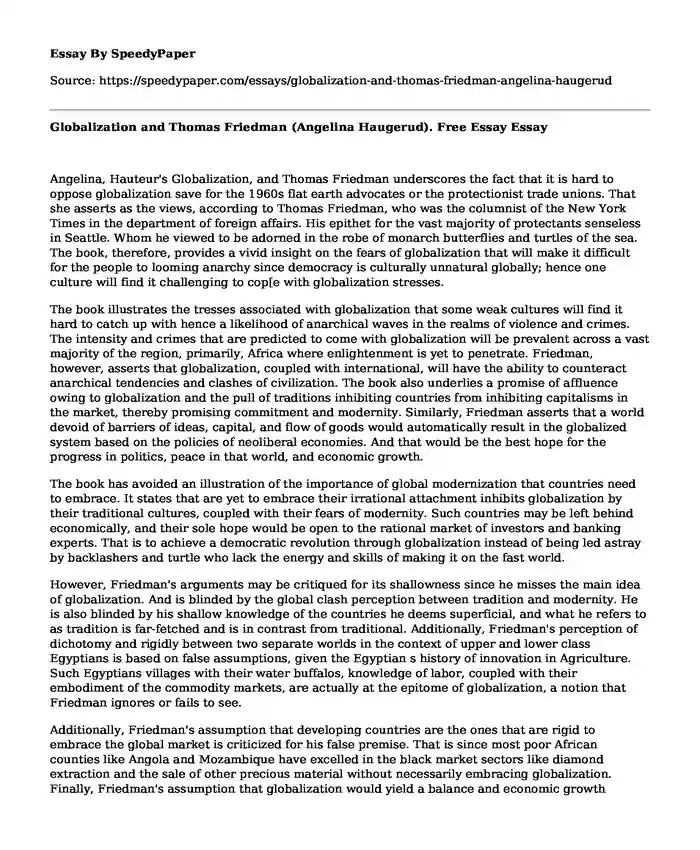
| Type of paper: | Essay |
| Categories: | Globalization Social issue Books |
| Pages: | 3 |
| Wordcount: | 590 words |
Angelina, Hauteur's Globalization, and Thomas Friedman underscores the fact that it is hard to oppose globalization save for the 1960s flat earth advocates or the protectionist trade unions. That she asserts as the views, according to Thomas Friedman, who was the columnist of the New York Times in the department of foreign affairs. His epithet for the vast majority of protectants senseless in Seattle. Whom he viewed to be adorned in the robe of monarch butterflies and turtles of the sea. The book, therefore, provides a vivid insight on the fears of globalization that will make it difficult for the people to looming anarchy since democracy is culturally unnatural globally; hence one culture will find it challenging to cop[e with globalization stresses.
The book illustrates the tresses associated with globalization that some weak cultures will find it hard to catch up with hence a likelihood of anarchical waves in the realms of violence and crimes. The intensity and crimes that are predicted to come with globalization will be prevalent across a vast majority of the region, primarily, Africa where enlightenment is yet to penetrate. Friedman, however, asserts that globalization, coupled with international, will have the ability to counteract anarchical tendencies and clashes of civilization. The book also underlies a promise of affluence owing to globalization and the pull of traditions inhibiting countries from inhibiting capitalisms in the market, thereby promising commitment and modernity. Similarly, Friedman asserts that a world devoid of barriers of ideas, capital, and flow of goods would automatically result in the globalized system based on the policies of neoliberal economies. And that would be the best hope for the progress in politics, peace in that world, and economic growth.
The book has avoided an illustration of the importance of global modernization that countries need to embrace. It states that are yet to embrace their irrational attachment inhibits globalization by their traditional cultures, coupled with their fears of modernity. Such countries may be left behind economically, and their sole hope would be open to the rational market of investors and banking experts. That is to achieve a democratic revolution through globalization instead of being led astray by backlashers and turtle who lack the energy and skills of making it on the fast world.
However, Friedman's arguments may be critiqued for its shallowness since he misses the main idea of globalization. And is blinded by the global clash perception between tradition and modernity. He is also blinded by his shallow knowledge of the countries he deems superficial, and what he refers to as tradition is far-fetched and is in contrast from traditional. Additionally, Friedman's perception of dichotomy and rigidly between two separate worlds in the context of upper and lower class Egyptians is based on false assumptions, given the Egyptian s history of innovation in Agriculture. Such Egyptians villages with their water buffalos, knowledge of labor, coupled with their embodiment of the commodity markets, are actually at the epitome of globalization, a notion that Friedman ignores or fails to see.
Additionally, Friedman's assumption that developing countries are the ones that are rigid to embrace the global market is criticized for his false premise. That is since most poor African counties like Angola and Mozambique have excelled in the black market sectors like diamond extraction and the sale of other precious material without necessarily embracing globalization. Finally, Friedman's assumption that globalization would yield a balance and economic growth globally is a hoax since some countries excel differently through the black market, according to the IMF and World Bank indices.
Cite this page
Globalization and Thomas Friedman (Angelina Haugerud). Free Essay. (2023, Apr 04). Retrieved from https://speedypaper.com/essays/globalization-and-thomas-friedman-angelina-haugerud
Request Removal
If you are the original author of this essay and no longer wish to have it published on the SpeedyPaper website, please click below to request its removal:
- Free Essay Example on Work Breakdown Structure
- Psychology Essay Sample on Human Sexuality
- Free Essay Sample on a Rape on Campus
- Free Essay on the Role of the Family Nurse Practitioner
- Career Essay Example: Accountant - Financial Advisor
- Gender and Language Essay Example
- Paper Example: The Social and Economic Lived Experiences of Teen Mothers
Popular categories




